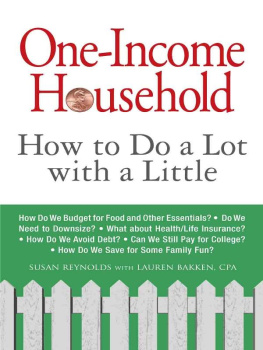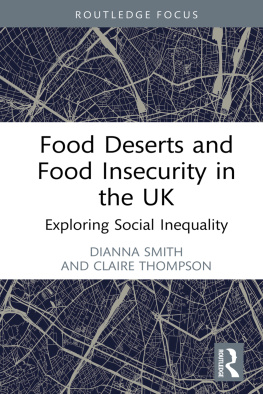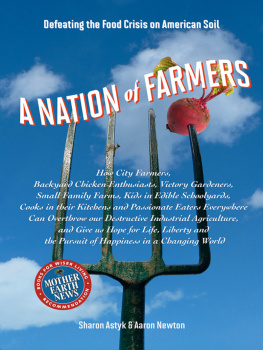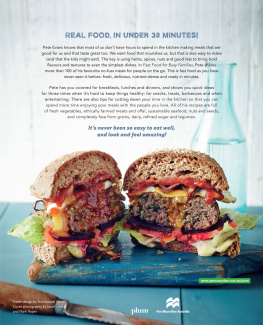Families and Food in Hard Times
Families and Food in Hard Times
European comparative research
Rebecca OConnell and Julia Brannen
First published in 2021 by
UCL Press
University College London
Gower Street
London WC1E 6BT
Available to download free: www.uclpress.co.uk
Text Authors, 2021
Images Authors and copyright holders named in captions, 2021
Tables Authors unless mentioned otherwise in the captions, 2021
The authors have asserted their rights under the Copyright, Designs and Patents Act 1988 to be identified as the authors of this work.
A CIP catalogue record for this book is available from The British Library.
This book is published under a Creative Commons Attribution-Non-Commercial 4.0 International licence (CC BY-NC 4.0). This licence allows you to share and adapt the work for non-commercial use providing attribution is made to the author and publisher (but not in any way that suggests that they endorse you or your use of the work) and any changes are indicated.
OConnell, R. and Brannen, J. 2021. Families and Food in Hard Times: European comparative research. London: UCL Press. https://doi.org/10.14324/111.9781787356559
Further details about Creative Commons licences are available at http://creativecommons.org/licenses/
Any third-party material in this book is published under the books Creative Commons
licence unless indicated otherwise in the credit line to the material. If you would
like to reuse any third-party material not covered by the books Creative Commons
licence, you will need to obtain permission directly from the copyright holder.
ISBN: 978-1-78735-657-3 (Hbk.)
ISBN: 978-1-78735-656-6 (Pbk.)
ISBN: 978-1-78735-655-9 (pdf)
ISBN: 978-1-78735-658-0 (epub)
ISBN: 978-1-78735-659-7 (mobi)
DOI: https://doi.org/10.14324/111.9781787356559
Se podes olhar, v. Se podes ver, repara.
[If you can see, look. If you can look, observe.]
Livro dos Conselhos
Contents
First and foremost, we wish to thank the families who participated in the study. We would also like to thank and acknowledge the co-researchers with whom we carried out the research on which the book is based. The team included: in the UK, Laura Hamilton, Abigail Knight, Charlie Owen, Antonia Simon (Thomas Coram Research Unit, Institute of Education, UCL); in Portugal, Manuel Abrantes, Fbio Augusto, Snia Cardoso, Vasco Ramos, Mnica Truninger and Karin Wall (Instituto de Cincias Sociais da Universidade de Lisboa); in Norway, Silje Skuland and Anine Frisland (Consumption Research Norway, Oslo Metropolitan University). Penny Mellor and Ccile Brmont provided administrative support. We are grateful for your commitment, flexibility and collegiality. We have learned a great deal from all of you.
The Advisory Group was supportive, challenging and vital to the studys success. Its members included Elizabeth Dowler, University of Warwick (Chair); Niall Cooper, Church Action on Poverty; Linda Hantrais, Loughborough University; Anne Harrop, Aga Khan Foundation; Lotte Holm, University of Copenhagen; Imran Hussain and Louisa McGeehan, Child Poverty Action Group; Virginia Morrow, University of Oxford; Matt Padley, University of Loughborough; Imogen Richmond-Bishop, Sustain; Robert Walker, University of Oxford; and Wendy Wills, University of Hertfordshire. Thank you all for your expert advice, keeping us on track and helping us make the findings useful. We are also grateful to Ruth Wright for valued comments on the draft, Daisy OConnell for vignette drawings and our colleagues at the Thomas Coram Research Unit, for all their support.
Finally, thanks are of course due to the European Research Council (ERC), who funded the study under the European Unions Seventh Framework Programme (FP7/20072013), ERC grant agreement number 337977. The Starting Grant scheme provided the resources needed to support and foster the development of a community of practice that recognises the value of research mentorship. In the years since we (Rebecca and Julia) travelled together to an ERC boardroom in Brussels with Rebeccas three-week-old baby in tow, much has changed. But our enjoyment in working together has not. We are very grateful for the opportunity to collaborate on the research and the book and hope it does justice to the stories of the children and families who took part.
In every country in every period of history there have been two flames burning: the flame of anger against injustice and the flame of hope that we can build a better world. Both of these flames have to be kept alive. (Tony Benn interviewed by Steve McGiffen )
In Hard Times, published in 1854, Charles Dickens set out some fundamental principles of what he called the Gradgrind philosophy, which, in some respects, bears a striking resemblance to the neoliberal capitalism that has dominated the world since the late 1970s:
A fundamental principle of the Gradgrind philosophy [was] that everything was to be paid for. Nobody was ever on any account to give anybody anything, or render anybody help without purchase. Gratitude was to be abolished, and the virtues springing from it were not to be. Every inch of the existence of mankind, from birth to death, was to be a bargain across a counter. And if we didnt get to Heaven that way, it was not a politico-economical place, and we had no business there. (Dickens , 340)
This book, Families and Food in Hard Times, is about our world in the second decade of the twenty-first century and how parents living on low incomes in wealthy societies manage to feed their families. Although very different from the world of Dickens, in some respects todays world mirrors elements of his time because of the harsh realities of poverty among large sections of the population in the Global North. Just as the poor in many of Dickenss novels struggle to keep their heads above water, to put food on the table and to hold on to their dignity, so too do the low-income families who have been living through the period since the 2008 global financial crisis. Now, as in the nineteenth century, food poverty in rich societies powerfully reveals the fundamental shortcomings of unbridled reliance on markets (Poppendieck , 565).
In Dickenss Hard Times, workers aspirations for better standards of living were denigrated as unrealistic; entitlements to turtle soup and venison, with a gold spoon were not for the likes of them. One , n.p.). Through living and eating within their means, these actors suggest, the poor should know their place. For, as Dickens recognised, food is fundamentally a symbolic as well as material resource, an expression of a persons worth and a powerful lens through which to view the social order.
The context in which we are writing this Introduction is not only very different from Dickenss time; it is also very different from that in which we designed the study, carried out the research and wrote much of the book. The study on which the book is based was funded by the European Research Council, a public body that funds scientific and technological research conducted within the European Union (EU). It was conceived at a time (2012) when the UK was a member of the EU, an international commitment that we did not seriously think the UK government would terminate. Since the UK has left the European Union, the UKs future research is further compromised as the government proposes to fund UK researchers participation in Horizon Europe from its existing (UKRI) research budget.







